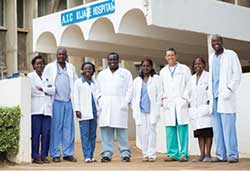As a young anesthesiologist, Mark Newton, MD, made a brave and unusual decision. Together with his wife Sue and their two small sons, he moved to rural Kenya to work at Kijabe Hospital. It wasn’t just a visit; with over a decade of medical mission work under his belt, Dr. Newton realized that to have an enduring influence as a medical educator in Africa, he needed to live where he was practicing.
Eighteen years later, Dr. Newton and his family—the couple now have five children, two of whom are adopted—are still there. In that time, the hospital has expanded to include a pediatric anesthesia fellowship, a training program for registered nurse anesthetists (over 100 graduates), a specialized pediatric surgical center (two pediatric surgery fellowships) and an operating room complex that cares for thousands of patients per year.
The 265-bed hospital sees between 300 and 400 outpatients a day, with one-third of them traveling over 100 km. It remains one of the most affordable, high-quality hospitals in East Africa. As the hospital grows, the needs are increasing, and more patients need surgery.
Vanderbilt University Program
Founded a century ago by American missionaries, Kijabe has long been a destination for Western physicians, residents and fellows. Some stay for months, others for decades. All of the Kijabe long-term Western physicians work on a volunteer basis, committed to its spiritual mandate to help the poor and to educate Africa’s health care providers in an African context.
“This is our life calling,” Dr. Newton said on the phone from Vanderbilt University, in Nashville, Tenn., where he is an associate professor in the Department of Anesthesiology. At Vanderbilt, he directs an international exchange program that sends roughly half of the university’s anesthesiology residents to Kijabe for a month-long clinical rotation. Dr. Newton spends about 11 weeks a year at Vanderbilt, and the rest of his time at Kijabe.
Having traveled to many African countries, Dr. Newton and his wife were drawn to Kijabe for the community surrounding the hospital, which now numbers over 7,000. Kijabe Station boasts good infrastructure, including a church, girls’ and boys’ schools, a Christian boarding school and several small businesses. Situated on the escarpment overlooking the Rift Valley, the climate is pleasant and there are no mosquitoes. It’s only 65 km northwest of the sweltering Kenyan capital of Nairobi, but nonetheless a world apart.
“We enjoy it,” said Dr. Newton, who was awarded the American Medical Association’s prestigious Nathan Davis International Award in Medicine in 2012. He’s very pleased by the integration of the African and foreign communities at Kijabe. “Our kids are all born in the same hospital, have surgery in the same hospital, go to school together.” The “Kijabe Model” for surgery and anesthesia education, which includes African and foreign clinical educators, provides a sustainable educational environment.
It’s a successful little ecosystem, but exceptional; most Africans don’t have access to Kijabe’s level of medical care. Life expectancy in Kenya is 62 years, on the rebound from an HIV/AIDS-related low of 55 years in 2009. Dr. Newton says the critical focus now must be on health care—basic things such as immunization and mosquito nets—and surgery, estimating sub-Saharan Africa’s surgical and anesthesia-related mortality rates to be among the highest in the world.
Obstetrics also remains a “big killer.” At 360 deaths per 100,000 live births, Kenya’s maternal mortality rate is below the sub-Saharan average, but the majority of those deaths are caused by preventable conditions such as severe bleeding, obstructed labor and infection.
In this context, Dr. Newton believes the most significant contribution he can make is in education and building local capabilities.
“We need to build infrastructure to train African doctors and to promote local talent,” he said. International exchanges are fruitful, but they aren’t available to most Africans and training received abroad is only partly applicable. Dr. Newton estimated that one-third of the curriculum taught at Vanderbilt would not apply in a typical African medical setting, where surgeries are commonly performed without oxygen or anesthetic machines.
Far more useful, he said, is to train nurses and physicians at Kijabe and send them into the field to train others. Through a substantial grant he recently received from the GE Foundation’s Developing Health Globally program, he has been able to offer several training programs to local anesthetic providers. The programs include a “train the trainer” component to ensure that the skills learned are disseminated further. On graduation, trainees are given a tool kit that includes a stethoscope, laryngoscope set and pulse oximeter. Dr. Newton estimates that through the multiplier effect, Kijabe makes possible roughly 30,000 administrations of anesthetics each year.
Dr. Newton keeps in touch with the people who he trains. Among them are registered nurses who have worked through the horrors of the civil war in southern Sudan, and surgeons who have had to conduct cesarean deliveries without a trained anesthesia care provider or use syringes to create suction to resuscitate a newborn in the absence of suction machines.
“These are the MacGyvers of anesthesiology,” he said, deeply impressed by the resourcefulness of local physicians and nurses. “Top, skilled American doctors would have real trouble in these situations.”
Understandably, Dr. Newton gets frustrated when he returns to the United States and hears the general level of discontent and griping. “There’s a huge cultural difference in attitudes. In general, Africans are so extremely grateful for the health care they receive,” he said.
The glaring asymmetry of global health care is ever present in Dr. Newton’s work. He cites the fact that in the United States, there is one pediatric surgeon for every 150,000 children under the age of 17 years, whereas the country of Malawi, with a population of 6 million children, gets by with a single one.
Dr. Newton remains undaunted, however, likening the work he does at Kijabe to a marathon. It’s this simple, he said: “The way to change severe poverty here is through medical education.”

